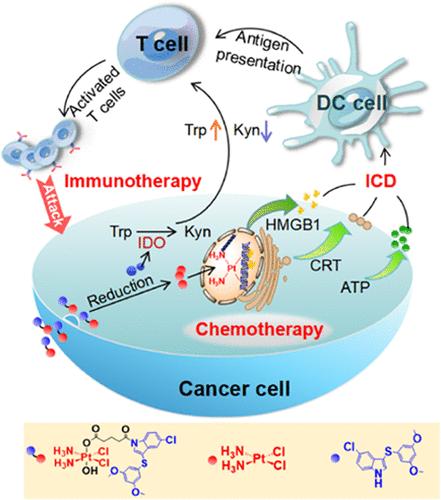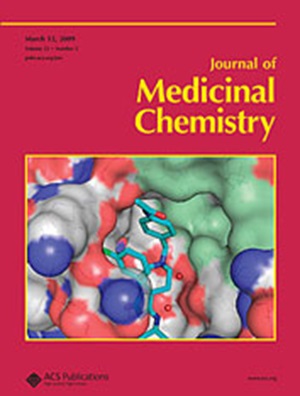Novel Indoleamine-2,3-Dioxygenase-Targeted Pt(IV) Prodrugs Regulate the Tumor Immune Microenvironment to Achieve Chemoimmunotherapy In Vitro and In Vivo
IF 6.8
1区 医学
Q1 CHEMISTRY, MEDICINAL
引用次数: 0
Abstract
Convincing evidence revealed that some platinum-based drugs could stimulate immunological recognition, thereby inducing immunogenic cell death (ICD). Indoleamine-2,3-dioxygenase (IDO) is overexpressed in tumors, which caused exhaustion of tryptophan (T-cell energy) and constructed an immunosuppressive tumor microenvironment. Herein, considering IDO inhibition to improve chemotherapy, a series of IDOi-Pt(IV) prodrugs were designed to not only target DNA and IDO but also facilitate tumor-antigen exposure and immunomodulation. The optimal IDOi-Pt(IV) prodrugs (named compound 10) significantly enhanced intracellular accumulation 22.4-fold and cytotoxicity 61.75-fold superior to cisplatin in HeLa cells. Moreover, immunofluorescence and enzyme-linked immunosorbent assays revealed that 10 induced reactive oxygen species-mediated endoplasmic reticulum stress and secretion of damage-associated molecular patterns, thereby presenting ICD effects. Molecular docking, enzyme inhibition, and Western blot assays demonstrated that 10 could effectively inhibit IDO1 and reverse immunosuppression, as further verified by mixed leukocyte reactions. In vivo tests showed that 10 exhibited high-efficiency and low-toxicity antitumor effects compared to cisplatin, presenting successful chemoimmunotherapy.

求助全文
约1分钟内获得全文
求助全文
来源期刊

Journal of Medicinal Chemistry
医学-医药化学
CiteScore
4.00
自引率
11.00%
发文量
804
审稿时长
1.9 months
期刊介绍:
The Journal of Medicinal Chemistry is a prestigious biweekly peer-reviewed publication that focuses on the multifaceted field of medicinal chemistry. Since its inception in 1959 as the Journal of Medicinal and Pharmaceutical Chemistry, it has evolved to become a cornerstone in the dissemination of research findings related to the design, synthesis, and development of therapeutic agents.
The Journal of Medicinal Chemistry is recognized for its significant impact in the scientific community, as evidenced by its 2022 impact factor of 7.3. This metric reflects the journal's influence and the importance of its content in shaping the future of drug discovery and development. The journal serves as a vital resource for chemists, pharmacologists, and other researchers interested in the molecular mechanisms of drug action and the optimization of therapeutic compounds.
 求助内容:
求助内容: 应助结果提醒方式:
应助结果提醒方式:


